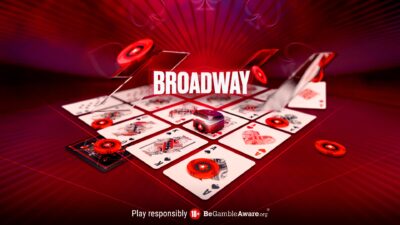Maria Konnikova is among the hundreds of players starting today’s Day 1B. Like everyone else, she’s ready to test her poker skills against those of her opponents, and against the chance element represented by the cards that will be dealt.
Like others, Konnikova enjoys the competition and the conflict the game inherently invites. But she’s also intrigued — perhaps more than most — by the game’s broader conflict, the one between skill and luck, and how the vagaries of chance can affect even the most skillful players’ decision-making at the tables.
In fact, she’s so intrigued, she’s writing a book about it.
Born in Russia before moving as a child with her family to Massachusetts, Konnikova earned degrees from Harvard and Columbia, including a Ph.D. in psychology. She has written for Scientific American, The New York Times, The Atlantic, and The Paris Review (among many other publications), and has produced two highly regarded NYT bestsellers — Mastermind: How to Think Like Sherlock Holmes and The Confidence Game: Why We Fall for It… Every Time.
Through all of that, though, poker wasn’t part of her education. Or entertainment. Or anything.
“My poker background is zero,” Konnikova grinned before sharing her story with us.
But now she’s embarking on a journey to learn the game and write about it in a new book — one not just for poker players, but for anyone interested in finding out how learning poker can help us learn to make better decisions in our lives. Poker Hall of Famer Erik Seidel is even part of the project, collaborating with Konnikova as a coach and mentor as she spends a year playing the tournament circuit.
What exactly brought Konnikova to poker — to find the game a worthwhile context in which to continue her inquiry into how the human mind works, and to explore her curiosity about how luck and skill intersect not just when playing cards, but in the game of life?
It was, well… by chance.
“A few years ago my family had a really rough year,” she explains, going on to tell how a series of illnesses, job losses, and deaths invited thoughts about how certain things are beyond our control, no matter how smart or “skilled” we might be.
“I started thinking about the role chance plays in our lives. I don’t think that’s something we often have consciously in our minds, especially when everything is going well. I thought this was fascinating and that I wanted to write about it — to try to answer the question of how much of our lives do we actually control.”
Recognizing what a huge, unwieldy question that really is, Konnikova began to narrow her scope. As she read more and more about chance, she naturally gravitated toward the discipline of game theory and the classic 1944 text Theory of Games and Economic Behavior by John von Neumann and Oskar Morgenstern.
An earlier article by von Neumann about poker had been the basis for the study, and it was von Neuman’s promotion of poker as a partial information game genuinely representative of life itself she found most inspiring.
“He decided if you could solve poker, you could solve the most complex human decisions,” explains Konnikova.
“So… I started reading about poker.”
Gradually Konnikova began to appreciate more and more how poker “was a really good lens through which to explore this question” about how we make decisions. As humans, we usually recognize we can’t control everything, but even knowing this truth we don’t always respond rationally — we don’t use that knowledge to help us make better decisions.
“The human brain learns really well from experience,” Konnikova notes, though adds how in many contexts “our experiences in real life are totally skewed” by outlier events — say a tragedy that befalls us or some other bit of bad luck. In those cases, experience can betray us, causing us to weigh incorrectly what the real probabilities governing our existence are.
“Now the thing about poker — and this was kind of my ‘a-ha’ moment — is that you’re learning from experience and you’re sampling correctly,” Konnikova points out. “So over time, if you’re playing correctly and not just gambling, you’re actually figuring out how often chance comes into play. You’re absorbing this on a level where your brain can actually learn from it, because you’re learning from experience and not from someone telling you or reading a book.”
Here, then, was some experience well worth gathering, thought Konnikova.
“Wouldn’t it be interesting if I as a total outsider immersed myself in this world and went on this learning journey with the best minds… basically do it full-time myself, professionally, and see what I could do and how it affects my life?”
Learning and getting better at poker is a goal, then, but not the end goal. Rather, Konnikova plans to write a book from which non-poker players can benefit, showing how “if people actually take the time to learn how to play poker correctly… they can become a lot better at making decisions and being much smarter in other ways as they go through life.”
Konnikova’s plan includes playing major events for at least a year, starting with the recent PokerStars Championship Monte-Carlo and ending next spring in Monaco. As one of the game’s best players for the last three decades, Erik Seidel was Konnikova’s first choice as guide on her journey, and she’s very grateful he agreed to take part. That he’s a friendly person with a genuine interest in psychology is a big bonus, too.
Another plus — as anyone who follows Seidel on Twitter knows — he’s a pretty funny guy.
“Erik will never let me live this down,” says Konnikova with a laugh. “The first conversation I had with him — when I was pitching [the idea] of him taking me on as a student and working with me on this project… I got the number of cards in a deck wrong. I thought there were 54.”
“He’s still making jokes that I’m waiting for the two jokers to come,” she laughs.
Seidel has recommended books, offered hand analyses, invited Konnikova to sweat his own play at times, and connected her with other great poker minds as well including Phil Galfond, Fedor Holz, Dan Harrington and others. It’s a fantastic poker education that she well knows is something special to experience, especially for a novice. And she’s approaching it as studiously as all of her previous studies.
“I’m treating it like my job,” she says. “For all intents and purposes… for this year, I’m a professional poker player. Every single day I am either playing or reading or analyzing.”
Her enthusiasm for poker and for the project is infectious. Konnikova’s education has also already produced three cashes in Monaco and three more here at the WSOP. That said, the profit she’s gained from learning about luck and skill in life and what poker can teach us about our non-poker lives is even greater.
Indeed, as much as Konnikova stands to learn about decision-making — and to teach us about it, eventually, with her book — it seems like she’s already made a pretty great decision.
WSOP photos by PokerPhotoArchive.com.
Back to Top










